初三英语语法总复习
- 格式:doc
- 大小:168.50 KB
- 文档页数:13
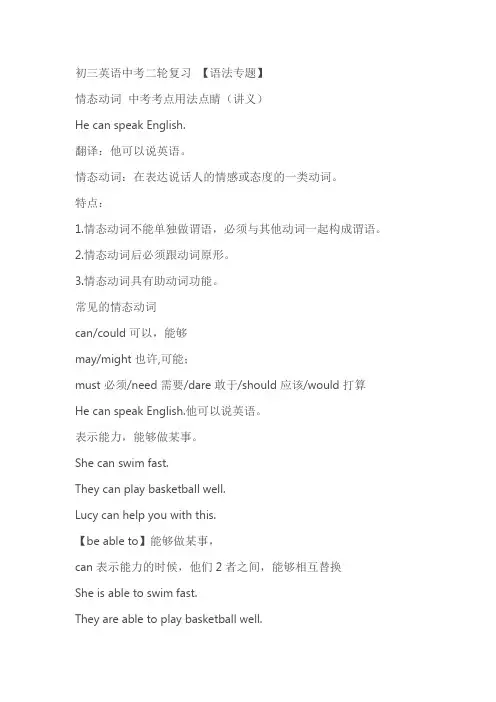
初三英语中考二轮复习【语法专题】情态动词中考考点用法点睛(讲义)He can speak English.翻译:他可以说英语。
情态动词:在表达说话人的情感或态度的一类动词。
特点:1.情态动词不能单独做谓语,必须与其他动词一起构成谓语。
2.情态动词后必须跟动词原形。
3.情态动词具有助动词功能。
常见的情态动词can/could可以,能够may/might也许,可能;must必须/need需要/dare敢于/should应该/would打算He can speak English.他可以说英语。
表示能力,能够做某事。
She can swim fast.They can play basketball well.Lucy can help you with this.【be able to】能够做某事,can表示能力的时候,他们2者之间,能够相互替换She is able to swim fast.They are able to play basketball well.Lucy is able to help you with this.He could write poems when he was 10. 翻译:他十岁时会写诗。
过去能够做某事,用,could来将其替换He could write poems when he was 10. 他十岁时就会写诗。
I could swim when I was seven years old. 我七岁的时候会游泳。
Leo could run fast when he was young. 利奥年轻的时候跑得很快。
在疑问句当中could 作为引导词出现——表达委外语气,请求做某事。
Could I have a drink我可以喝一杯吗?肯定回答只能用——Yes,you can. Could we meet again next week下周我们可以再见面吗?——Yes,we can.Could I come to see you tomorrow明天我能来看您吗?——Yes, you can.This news can't be true.翻译:这个消息不可能是真的。
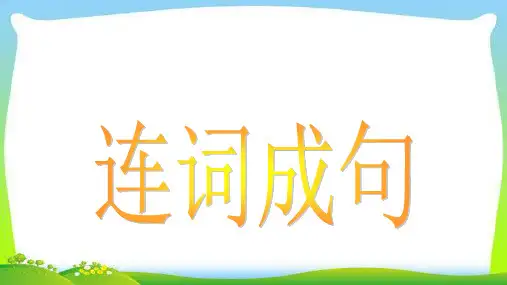
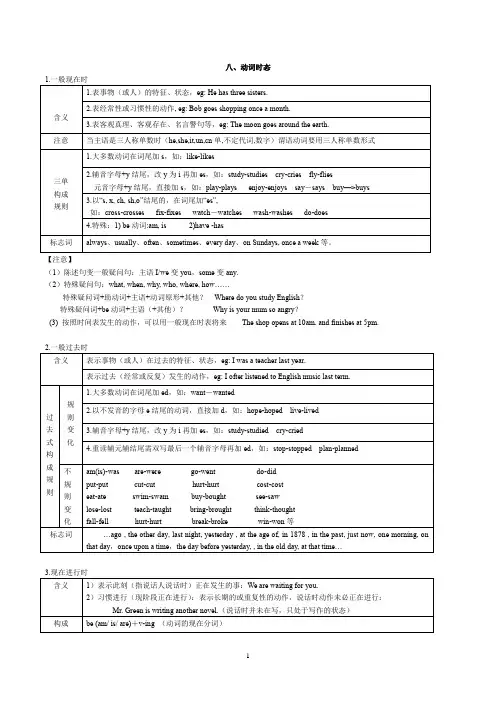
八、动词时态【注意】(1)陈述句变一般疑问句:主语I/we变you,some变any.(2)特殊疑问句:what, when, why, who, where, how……特殊疑问词+助动词+主语+动词原形+其他?Where do you study English?特殊疑问词+be动词+主语(+其他)?Why is your mum so angry?(3) 按照时间表发生的动作,可以用一般现在时表将来The shop opens at 10am. and finishes at 5pm.【注意】(1)always也可用于现在进行时,表示一种强烈的感情色彩,译为“总是”He is always telling lies.(2)某些特殊动词不能用于现在进行时。
① have当“有”讲时,不能用现在进行时。
I have two books now.②“belong to” The two people belong to me now.③表示“心理活动/状态/感觉”的词I want a dog now.① be going to主要用于:主观判断(1)表示事先经过考虑、安排好打算要做的事情:I’m going to play the violin.(2)表示根据目前某种迹象判断,某事非常有可能发生(有迹象表明要发生的事)。
Look!There come the dark clouds. It is going to rain.② will主要用于:(1)客观上将来势必发生的事情, 未经事先考虑, 临时决定的They will go to visit the factory tomorrow.(2)表示不以人的意志为转移的自然发展的未来的事:Today is Saturday. Tomorrow will be Sunday.(3)表意愿。
问对方是否愿意做某事或表示客气地邀请或命令:Will you please turn on the radio?(1) have/has been to “去过已回”She has been to Japan twice.have/has gone to. “去了未回”Where is your twin sister? She has gone to Japan.have/has been in “待在某地” She has been in Japan for 2 years. (2) 动词从词义上可以分为延续性和非延续性两种。
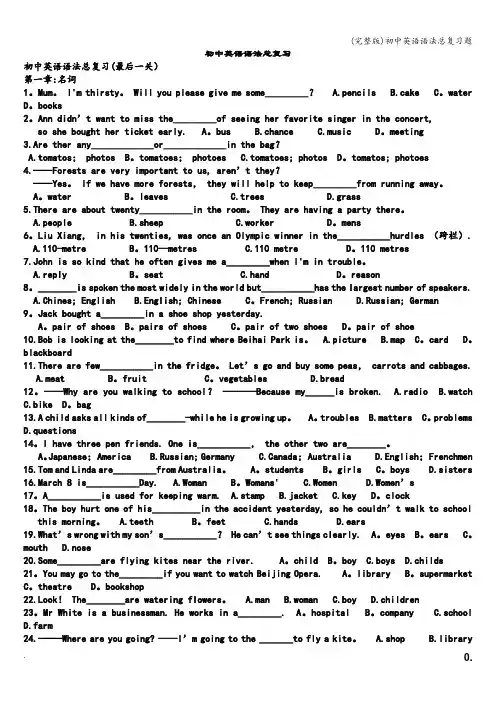
初中英语语法总复习初中英语语法总复习(最后一关)第一章:名词1。
Mum。
I'm thirsty。
Will you please give me some_________? A.pencils B.cake C。
water D。
books2。
Ann didn’t want to miss the_________of seeing her favorite singer in the concert, so she bought her ticket early. A。
bus B.chance C.music D。
meeting3.Are ther any_____________or_____________in the bag?A.tomatos; photos B。
tomatoes; photoes C.tomatoes; photos D。
tomatos; photoes4.—--Forests are very important to us, aren’t they?—--Yes。
If we have more forests, they will help to keep_________from running away。
A。
water B。
leaves C.trees D.grass5.There are about twenty___________in the room。
They are having a party there。
A.peopleB.sheepC.worker D。
mens6。
Liu Xiang, in his twenties, was once an Olympic winner in the___________hurdles (跨栏).A.110-metre B。
110—metres C.110 metre D。
110 metres7.John is so kind that he often gives me a_________when I'm in trouble。
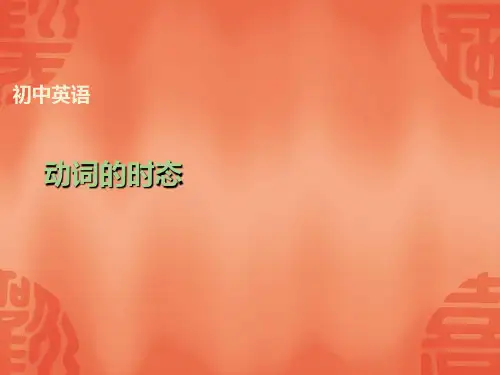
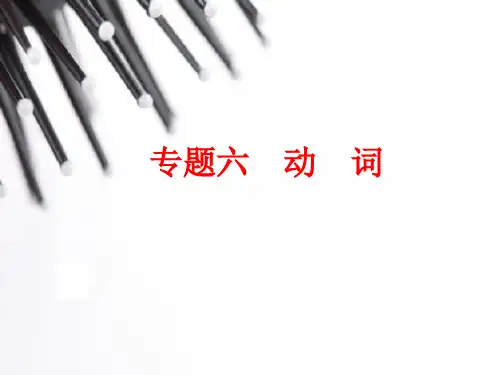
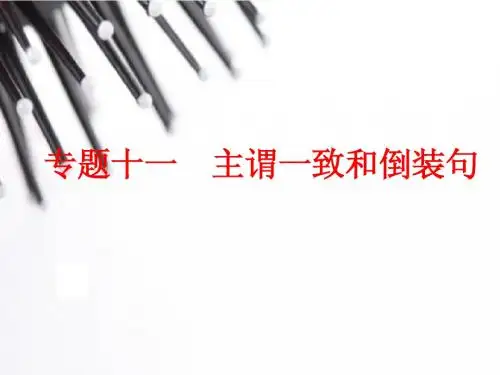
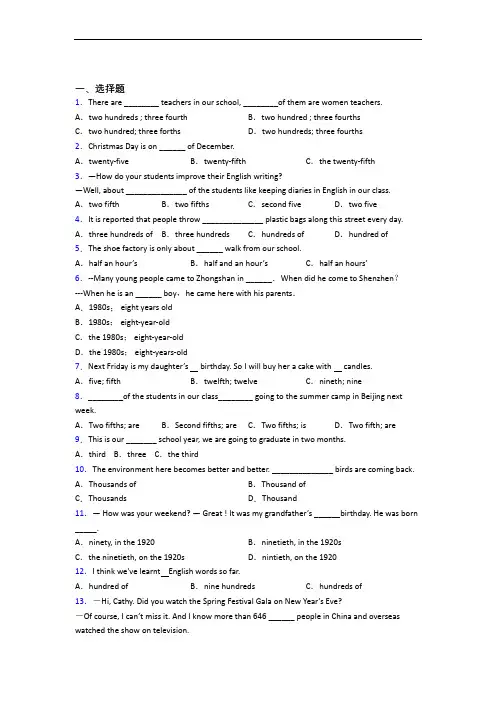
一、选择题1.There are ________ teachers in our school, ________of them are women teachers.A.two hundreds ; three fourth B.two hundred ; three fourthsC.two hundred; three forths D.two hundreds; three fourths 2.Christmas Day is on ______ of December.A.twenty-five B.twenty-fifth C.the twenty-fifth 3.—How do your students improve their English writing?—Well, about ______________ of the students like keeping diaries in English in our class. A.two fifth B.two fifths C.second five D.two five4.It is reported that people throw ______________ plastic bags along this street every day. A.three hundreds of B.three hundreds C.hundreds of D.hundred of 5.The shoe factory is only about ______ walk from our school.A.half an hour’s B.half and an hour’s C.half an hours’6.--Many young people came to Zhongshan in ______.When did he come to Shenzhen?---When he is an ______ boy,he came here with his parents.A.1980s; eight years oldB.1980s; eight-year-oldC.the 1980s; eight-year-oldD.the 1980s; eight-years-old7.Next Friday is my daughter’s birthday. So I will buy her a cake with candles.A.five; fifth B.twelfth; twelve C.nineth; nine8.________of the students in our class________ going to the summer camp in Beijing next week.A.Two fifths; are B.Second fifths; are C.Two fifths; is D.Two fifth; are 9.This is our _______ school year, we are going to graduate in two months.A.third B.three C.the third10.The environment here becomes better and better. ______________ birds are coming back. A.Thousands of B.Thousand ofC.Thousands D.Thousand11.— How was your weekend? —Great ! It was my grandfather’s ______birthday. He was born _____.A.ninety, in the 1920 B.ninetieth, in the 1920sC.the ninetieth, on the 1920s D.nintieth, on the 192012.I think we've learnt English words so far.A.hundred of B.nine hundreds C.hundreds of13.-Hi, Cathy. Did you watch the Spring Festival Gala on New Year’s Eve?-Of course, I can’t miss it. And I know more than 646 ______ people in China and overseas watched the show on television.A.million B.millions of C.millions D.million of 14.______of the teachers in our school is 118, ______ of them are women teachers. A.The number; first fourth B.The number; one fourthC.A number; one second D.A number; three quarters15.Every day, _______ people wait to watch the raising of the national flag at Tian’anmen Square.A.thousands B.two thousands C.thousand of D.thousands of 16.--- Which is the biggest number of the four?--- ______.A.One third B.A half C.Two thirds D.A quarter 17.—Good news! We will have a ________ holiday.—I’ve heard of it. But it’s coming in ________.A.three days; three days’ time B.three days’; three days’C.three-day; three days D.three days; three-day time 18.—Hi, Jack! What about playing soccer after school?—I’d love to, but it’s my grandfather’s ______ birthday and we will have a celebration. A.ninetith B.ninetieth C.nintieth 19.Father’s Day is on _________ Sunday of June.A.three B.the three C.third D.the third 20.Jim failed twice, but he wanted to have __________ try.A.a second B.a third C.the second D.the third 21.—Simon, how old is your father this year?—______. And we just had a special birthday party for his _____ birthday last Sunday. A.Fortieth; forty B.Forty; fortyC.Forty; fortieth D.Fortieth; fortieth22.My grandparents live in an old apartment with floors and they are on the floor. A.fifth; three B.fifth; third C.five; three D.five;: third 23.We’ve planted ________ trees in the center of our city this year.A.hundred B.hundreds C.hundredth D.hundreds of 24.A year is divided into ______ months. September is the _____ month of the year. A.twelve, ninth B.twelve, nineth C.twelfth, ninth D.twelfth, nineth 25.In China, about ___________ of people live in the country.A.three fifth B.third fifthC.three fifths D.three fives【参考答案】***试卷处理标记,请不要删除一、选择题1.C解析:C【解析】试题分析:句意:在我们学校有两千老师,他们中的四分之三是女老师。

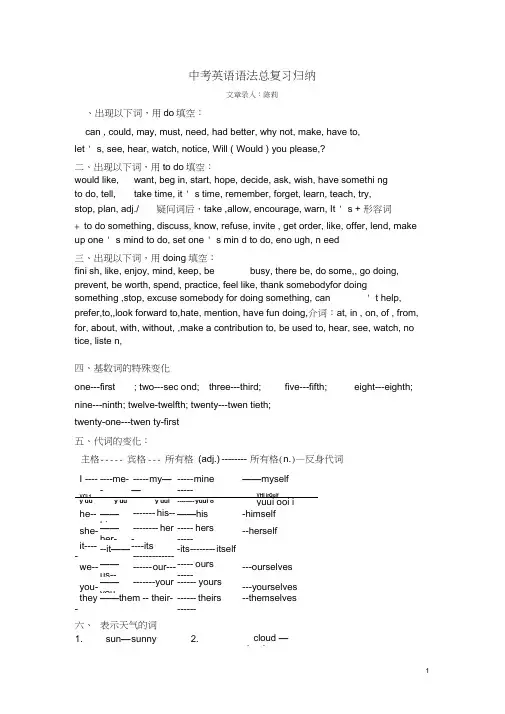
1 中考英语语法总复习归纳 文章录入:陈莉 、出现以下词,用do填空: can , could, may, must, need, had better, why not, make, have to, let ' s, see, hear, watch, notice, Will ( Would ) you please,? 二、 出现以下词,用to do填空: would like, want, beg in, start, hope, decide, ask, wish, have somethi ng to do, tell, take time, it ' s time, remember, forget, learn, teach, try, stop, plan, adj./ 疑问词后,take ,allow, encourage, warn, It ' s + 形容词 + to do something, discuss, know, refuse, invite , get order, like, offer, lend, make up one ' s mind to do, set one ' s min d to do, eno ugh, n eed
三、 出现以下词,用doing 填空: fini sh, like, enjoy, mind, keep, be busy, there be, do some,, go doing, prevent, be worth, spend, practice, feel like, thank somebodyfor doing something ,stop, excuse somebody for doing something, can ' t help, prefer,to,,look forward to,hate, mention, have fun doing,介词:at, in , on, of , from, for, about, with, without, ,make a contribution to, be used to, hear, see, watch, no tice, liste n,
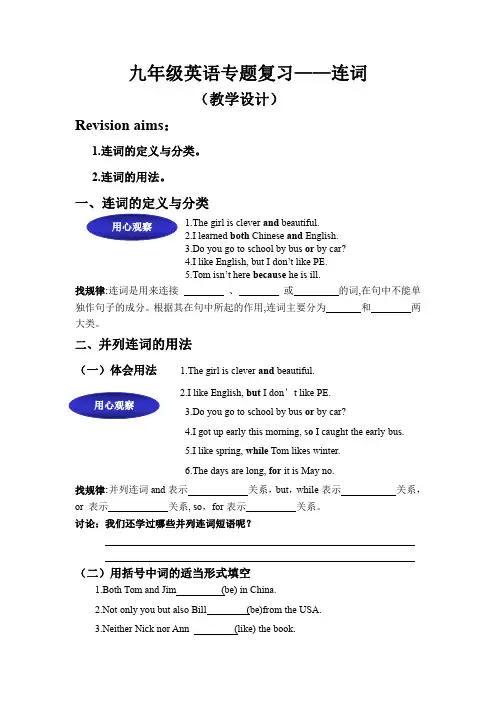
九年级英语专题复习——连词(教学设计)Revision aims:1.连词的定义与分类。
2.连词的用法。
一、连词的定义与分类1.The girl is clever and beautiful.2.I learned both Chinese and English.3.Do you go to school by bus or by car?4.I like English,but I don’t like PE.5.Tom isn’t here because he is ill.找规律:连词是用来连接、或的词,在句中不能单独作句子的成分。
根据其在句中所起的作用,连词主要分为和两大类。
二、并列连词的用法(一)体会用法 1.The girl is clever and beautiful.2.I like English,but I don’t like PE.3.Do you go to school by bus or by car?4.I got up early this morning,so I caught the early bus.5.I like spring,while Tom likes winter.6.The days are long,for it is May no.找规律:并列连词and表示关系,but,while表示关系,or表示关系,so,for表示关系。
讨论:我们还学过哪些并列连词短语呢?(二)用括号中词的适当形式填空1.Both Tom and Jim(be)in China.2.Not only you but also Bill(be)from the USA.3.Neither Nick nor Ann(like)the book.4.Either you or Tom(be)right.做题技巧小结:1.both...and...连接两个主语时,谓语动词要用。
学员编号: 年级: 初三课时数: 3学员姓名: 辅导科目: 英语学科教师: 学员姓名:辅导科目:英语学科教师:授课类型C语法专题之动词及动词短语教学目标 1.了解动词及动词短语的考点。
2、复习动词及动词短语知识点星级★★授课日期及时段教学内容C-中考考点之动词及动词短语(建议2-5分钟)一. 问题结合图片导入Q: what are the man in the picture doing ?Keys: She is dancing. She is singing.He is doing magic .(建议20-25分钟)中考考点动词及动词短语一、考点扫描1.动词和动词词组辨析。
2.常用动词于名词、副词、介词构成的短语动词的基本含义和引申义。
二、考点诠释一、系动词的考查系动词亦称联系动词(Link Verb), 作为系动词, 它本身有词义, 但不能单独用作谓语, 后边必须跟表语(亦称补语), 构成系表结构说明主语的状况、性质、特征等情况。
英语中常见的表示状态变化的系动词主要有:1)状态系动词用来表示主语状态, 只有be一词, 例如:He is a teacher.他是一名教师。
(is与补足语一起说明主语的身份。
)2)持续系动词用来表示主语继续或保持一种状况或态度, 主要有keep, rest, remain, stay, lie, stand, 例如:He always kept silent at meeting.他开会时总保持沉默。
This matter rests a mystery.此事仍是一个谜。
3)表像系动词用来表示"看起来像"这一概念, 主要有seem, appear, look, 例如:He looks tired.他看起来很累。
He seems (to be) very sad.他看起来很伤心。
4)感官系动词感官系动词主要有feel, smell, sound, taste, 例如:This kind of cloth feels very soft.这种布手感很软。
中考英语总复习教案一语法重点:一般现在时态 (Simple Present tense)难点突破:一般现在时态中第三人称时动词加“s”的用法知识目标:通过操练、点评、专项练习等方式复习“一般现在时态”的时态结构。
复习步骤设计:(一)词汇复习Revision of the words and phrases learnt in UnitOne,dictationof the main ones。
(此环节也可根据中考词汇表顺序进行听写检查)(二)对话操练Dialogue Acting—ask Ss to act out some dialogues aboutWhat do you usually do on Sundays/in the evening? (此环节也可以采取学生达标积分制进行,即复习阶段课前对话必须人人参与)(三)语法复习:一般现在时态:(A) 概念:表示某人/某事物经常发生的动作、习惯、状态等。
(B) 时态信号:常与sometimes, often, usually, always, every day, in the morning, on Sunday 等词连用。
(C) 动词形式:用实义动词原形,第三人称时用动词加“s”形式,简称“三单动s”形式,“Be”动词用“am/ is/ are ”的形式。
(D)情态动词后面直接加实义动词原形。
(E) 在某些动词后面须用动词原形进行搭配,如let sb do sth, You’d beterr do sth 等。
例解:1、Now let me ____ your names, OK?A. callB. to callC.calling D. calls此题应选用“A”项。
在“Let sb.”后面的结构中应该用动词原形结构,不可以用其它形式,所以B项、C项和D项都是错误的。
2、He ________ the washing on Sundays. He _____ it on Saturdays.A. doesn’t/ doesB. don’t do/does C. doesn’t do/ does D. not does/ does此题应选用“C”项。
1、词类:英语词类分十种:名词、形容词、代词、数词、冠词、动词、副词、介词、连词、感叹词。
1、名词(n.):表示人、事物、地点或抽象概念名称。
如:boy, morning, bag, ball, class, orange.2、代词(pron.):主要用来代替名词。
如:who, she, you, it .3、形容词(adj..):表示人或事物性质或特征。
如:good, right, white, orange .4、数词(num.):表示数目或事物顺序。
如:one, two, three, first, second, third, fourth.5、动词(v.):表示动作或状态。
如:am, is,are,have,see .6、副词(adv.):修饰动词、形容词或其他副词,说明时间、地点、程度等。
如:now, very, here, often, quietly,slowly.7、冠词(art..):用在名词前,帮助说明名词。
如:a, an, the.8、介词(prep.):表示它后面名词或代词与其他句子成分关系。
如in, on, from, above, behind.9、连词(conj.):用来连接词、短语或句子。
如and, but, before .10、感叹词(interj..)表示喜、怒、哀、乐等感情。
如:oh, well, hi, hello.2、句子成分:英语句子成分分为七种:主语、谓语、宾语、定语、状语、表语、宾语补足语。
1、主语是句子所要说人或事物,回答是“谁”或者“什么”。
通常用名词或代词担任。
如:I’m Miss Green.(我是格林小姐)2、谓语动词说明主语动作或状态,回答“做(什么)”。
主要由动词担任。
如:Jack cleans the room every day. (杰克每天打扫房间)3、表语在系动词之后,说明主语身份或特征,回答是“什么”或者“怎么样”。
通常由名词、代词或形容词担任。
初三英语语法复习 名 词 一、 名词的分类:根据用法,名词可以分为可数名词和不可数名词两类。 1.可数名词有单、复数形式的区别。需要掌握规则名词的复数形式的构成。 *以y结尾的专有名词,或元音字母+y 结尾的名词变复数时,直接加s变复数: 如: two Marys the Henrys monkey---monkeys holiday---holidays 比较: 层楼:storey ---storeys story---stories * 以o 结尾的名词,变复数时: a. 加s,如: photo---photos piano---pianos radio---radios zoo---zoos; b. 加es,如:potato--potatoes tomato--tomatoes *以f或 fe 结尾的名词变复数时常去 f , fe 加 ves , 如:half---halves knife---knives leaf---leaves wife---wives life---lives thief---thieves 2.名词复数的不规则变化 1)child---children foot---feet tooth---teeth mouse---mice man---men woman---women 注意:与 man 和 woman构成的合成词,其复数形式也是 -men 和-women。 如: an Englishman,two Englishmen. 但German不是合成词,故复数形式为Germans;Bowman是姓,其复数是the Bowmans。 2)单复数同形 如:deer,sheep,fish,Chinese,Japanese li,jin,yuan,two li,three mu,four jin 但除人民币元、角、分外,美元、英镑、法郎等都有复数形式。如:a dollar, two dollars; a meter, two meters 3)以s结尾,仍为单数的名词,如: a. maths ,politics,physics等学科名词,为不可数名词,是单数。 b. news 是不可数名词。 c. the United States,the United Nations 应视为单数。 The United Nations was organized in 1945. 联合国是1945年组建起来的。 d. 以复数形式出现的书名,剧名,报纸,杂志名,也可视为单数。 "The Arabian Nights" is a very interesting story-book. <>是一本非常有趣的故事书。 4) 表示由两部分构成的东西,如:glasses (眼镜) trousers, clothes若表达具体数目,要借助数量词 pair(对,双); suit(套); a pair of glasses; two pairs of trousers 5) 另外还有一些名词,即可做不可数名词也可做可数名词,但意思不相同。 单词 可数名词意思 不可数名词意思 单词 可数名词意思 不可数名词意思 work 作品,著作 工作 German 德国人 德语 wood 森林 木头 life 生命 生活,人生 Chicken 小鸡 鸡肉 Exercise 练习,体操 运动,锻炼 Paper 报纸,试卷 纸 Orange 橘子 橙汁 Room 房间 空间 Glass 玻璃杯 玻璃 Time 次数,倍数 时间 Japanese 日本人 日语 Light 灯 光线 fish 鱼(种类) 鱼肉 6.)常以复数形式出现并使用的名词:clothes, people, trousers, glasses, scissors, thanks, congratulations, wishes, police, stairs(楼梯), works(著作), woods(森林), times(时代) 3.不可数名词量的表示 可以借助单位词表一定的数量。如: a glass of water 一杯水 a piece of cake 4.修饰可数名词的词有:many, few, a few, a number of, 数词 修饰不可数名词的词有:much, little, a little, a great deal of 即可修饰可数名词也可修饰不可数名词的词有:some (any), no, a lot of 二、定语名词的复数 (即名词修饰名词) 名词作定语一般用单数,但也有以下例外。 1) 用复数作定语。 如:sports meeting 运动会 students reading-room 学生阅览室 2) man, woman, 等作定语时,其单复数以所修饰的名词的单复数而定。 如:men workers women teachers 3) 数词+名词作定语时,这个名词一般保留单数形式。 如:two-dozen eggs 两打/(二十四个鸡蛋) a ten-mile walk 十里路 two-hundred trees 两百棵树 a five-year plan. 一个五年计划 some banana trees two book stores 三、名词的格 1.有生命的人、物及其他名词的所有格在词尾加“‟s”,如the boy‟s bag 男孩的书包 2. 若名词词尾已有-s ,只加’,如:Teachers’ Day the twins‟ parents, the students‟ books 3. 时间、距离、地域等名词的所有格形式为-‟s today‟s newspaper, ten minutes‟ walk the city‟s problem 4. 在表示店铺或教堂的名字或某人的家时,名词所有格的后面常常不出现它所修饰的名词,如:the barber's 理发店 at my aunt‟s (house) go to the doctor‟s . 5. 凡不能加"'s"的名词,都可以用"名词+of +名词"的结构来表示所有关系,如:the title of the song 歌的名字 the window of the house 。 6. 如果两个名词并列,并且分别有's,则表示"分别有";只有一个's,则表示'共有'。 如:John's and Mary's rooms(两间) John and Mary's room(一间) 7. 双重所有格形式:a novel of Mark Twin‟s a friend of my father‟s / mine
代 词 1.人称代词 1.)人称代词的主格在句子中作主语,例如: John waited a while but eventually he went home. 约翰等了一会儿,最后他回家了。 说明:在复合句中,如果主句和从句主语相同,代词主语要用在从句中,名词主语用在主句中, 例如:When he arrived, John went straight to the bank. 2.)人称代词的宾格在句子中作动词的宾语或介词宾语,第一人称在省略句中,还可以作主语。 例如:I saw her with them。 her做宾语,them做介词宾语, a. -- Who broke the vase? --谁打碎了花瓶? b. -- Me. --我。(me = It's me.)在正式文体中这里应为I。 宾格代替主格: a.在简短对话中,当人称代词单独使用或在not 后,多用宾语。 ---- I like English. --我喜欢英语。 ---- Me too. --我也喜欢。 ---- Have more wine? --再来点酒喝吗? ---Not me. --我可不要了。 b.在表示比较的非正式的文体中,常用宾格代替主格。 但如果比较状语的谓语保留,则主语只能用主格。He is taller than I/me. He is taller than I am. 3)动物名词的指代一般用it或they代替,有时也用he, she,带有亲切的感情色彩。 Give the cat some food. She is hungry. 给这猫一些吃的。她饿了。 4)指代车或国家,船舶的名词,含感情色彩时常用she。 1)单数人称代词并列作主语时,其顺序为: you, he / she and I You, he and I should return on time. 2) 复数人称代词作主语时,其顺序为: we, you and they *注意:在承认错误,承担责任时,第一人称放在前面 It was I and John that made her angry. 是我和约翰惹她生气了。 *it的主要用法:可以表示天气, 时间, 距离, 形式主语, 形式宾语, 身份等. 2. 物主代词(…人的): 包括形容词性的物主代词和名词性的物主代词 形容词性的物主代词 + 名词; 名词性的物主代词= 形容词性的物主代词+ 名词 3.反身代词:(1)加强语气,起强调作用,“…自己”, “亲自”, “本人” (2)用在一些动词后,表示主语既是动作的发出者,也是动作的承受者.常见的这类动词有:teach, dress, help, look after, enjoy, hurt, wash 4.不定代词 (1) none (of)指人或物 回答how many / much的问题 nobody, no one 指人 nothing指物 (2) one指人或物, 复数为ones, that指物(不可数名词),it指代前面提到的物体 I have got a nice watch. Would you like to buy one? ( a watch) I have got a nice watch. Do you like it? ( the watch) The weather here is better than that in Beijing. (the weather) (3) 三者或三者以上: all (全部,都) any (任何一个) none (一个也没有) 两者: both (全部,都) either (任意一个) neither(一个也没有) *Neither of us is from the USA. None of us have / has ever been there before. *not与both, all 连用表示部分否定. (4)some用于肯定句中,也可用于表示请求、建议或希望得到肯定答复的疑问句中 any用于疑问句、否定句中;还有“任何的”意思 (5)another泛指 另一个 the other常与 one 连用,表示两者中的另一个 one…the other… others 泛指别的,其他的 the others特指别的,其他的(有范围限制) (the) others = (the) other + 名词 else放在合成不定代词或疑问词之后 (6)every + 名词, 只能做定语, (三者或三者以上) each两者或两者以上的“每一”, 可以单独使用 常见的短语:each of each other (7)合成不定代词的用法(略)*形容词后置 (8)many, few, a few + 可数名词复数 much, little, a little+不可数名词 *little 作形容词, 小的 a little 还可以修饰形容词和副词的比较级和最高级